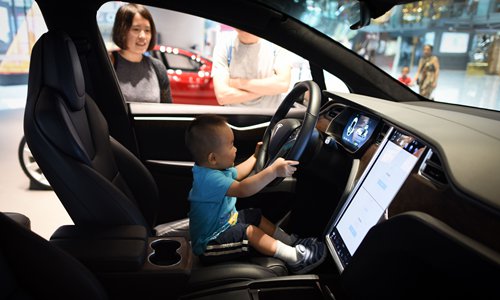HOME >> BUSINESS
Core US industries depend on China
By Xie Jun and Song Lin Source:Global Times Published: 2019/6/9 21:13:39
Expert says Trump prioritizes short-term over long-term benefits

A boy sits in a Tesla car during a visit to a Tesla showroom in Beijing. File photo: VCG
Leading US industries such as cars and high technology are highly dependent upon the Chinese market, which creates great demand for US products, a Chinese economist told the Global Times on Sunday.
The expert made the comment at a time when China, facing US actions to blacklist Huawei, citing national security, is taking measures to safeguard the interests of its companies.
On May 31, China announced its own "non-reliable entity list," saying that companies would be singled out for discriminatory actions against Chinese entities. This is interpreted by some experts as a signal that trade war pressure may escalate on some US companies that have business in China.
A New York Times report on Saturday also noted that some major tech companies, including Microsoft and Dell, have been summoned by the Chinese government recently, as they were demanded not to cooperate with the Trump administration's ban on sales of key US technologies to Chinese companies.
A Tianjin-based economist, who wished not to disclose his identity, said that although China's market share in US companies' overall global business landscape is limited, the Chinese market is of particular importance to leading US industries, including automobiles and high technology.
According to a report by Yahoo Finance in August 2018, of the S&P 500 companies - the 500 largest publicly traded US companies - 41 derived at least 10 percent of their revenue from sales in China in 2017.
A big portion of those were high-tech firms, such as Skyworks Solutions, a US semiconductor company that saw a stunning 84 percent of its revenue come from the Chinese market in 2017, and Qualcomm Inc, which derived 65 percent of its 2017 revenue from China, as well as Apple, 20 percent of whose revenue was generated in China that year.
Qualcomm didn't disclose its revenue from China when asked by the Global Times on Sunday.
Hu Yifan, regional chief investment officer and chief China economist at UBS Global Wealth Management, disclosed at a press conference on Thursday that almost 30 percent of purchases of US chips and semiconductor products are currently made by Chinese buyers.
"The application scenarios (for high-tech products) are widest in China, with the high penetration rate of smart phones and 4G coverage in China, which makes China a gigantic consumption market for US high-tech products," the Tianjin-based economist said.
Bet on China
According to the Yahoo Finance statistics, generally speaking, the S&P 500 companies saw 2 percent of their revenue generated in China in 2017, which amounted to about $499.6 billion.
"For one thing, 2 percent actually points toward a relatively large revenue scale. For another thing, the figures must be smaller than the actual revenues earned by US companies in China, as products 'made in China and sold in China,' which are typical among many US consumer goods companies, might not be included in the statistical data," Ni Feng, deputy director of the Chinese Academy of Social Sciences' Institute of American Studies, told the Global Times on Sunday.
Many US companies are either seeing business flourish in China or betting heavily on what the gigantic market can bring them.
US beverage-maker Coca-Cola, for instance, saw its sales surge by 9 percent year-on-year in the first quarter of 2019 in China, according to an article sent by a PR representative of the company to the Global Times on Sunday.
Yum China Holdings, the Chinese subsidiary of US-headquartered food giant Yum!, earned revenue of $8.42 billion in China in 2018, up 8 percent on a yearly basis, the company announced in February.
The US electric car maker Tesla is also in a rush to build a car plant in Shanghai with hopes of boosting local sales as well as cutting the cost of car production.
"For some US industries like automobiles, only China can provide ample business opportunities, as markets are more or less saturated and full of local competition in Europe and Japan," said the Tianjin-based expert.
"If the trade war escalates, it might take its toll on some US companies in China," the expert said.
According to the expert, it's possible that Trump wouldn't put the interests of some US companies on his priority list as he mounts efforts to pressure China in the trade talks.
"He now puts short-term benefits ahead of long-term benefits," he noted.
The expert said that China must fire back to show it will not compromise beyond its bottom line.
Posted in: ECONOMY